THE 6 GREAT GENERALS OF QIN
Before i start, I want to say that the 6 Great General system, together with the 3 Great Heavens or anything along that line were all fictitious though the members within the group were real. An exception to this is the 4 Great Lords of the Warring States(战国四君子), which is indeed a real group with real members.
Picture:
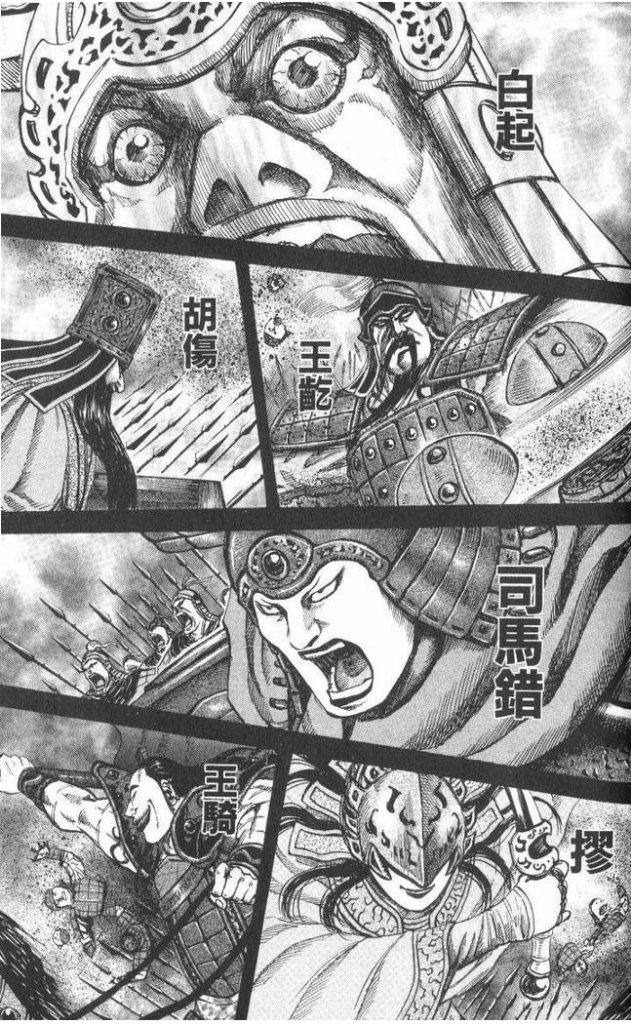
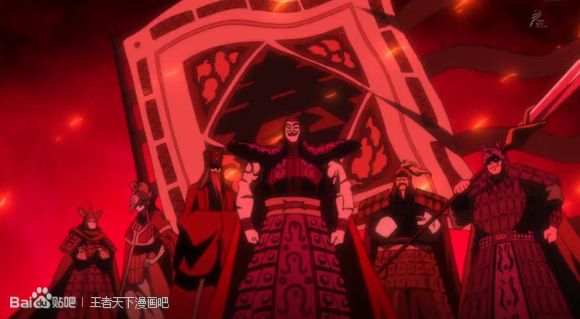
Kyou, Hakuki, Kousho, Shiba Saku and Ou Kotsu in Kingdom Guidebook 2
1. Ouki/Wang Qi
There was a time before the revelation of Ousen/Wang Jian in the manga and people mistook Ouki/Wang Qi as the more well known Ousen/Wang Jian, claiming that the author changed history. Therefore, i created this thread in the mangafox to clarify and to provide some information of the real Ouki/Wang Qi, before i started the original Ultimate Facts Thread in mangafox, which explains the slightly different format for this particular entry. The information of Ouki/Wang Qi below is copied/pasted from that post i made.
If you have not read up to chapter 174 of the manga and do not want to be spoiled, read no further. This is your only warning.
*
*
*
*
*
*
*
*
*
*
*
*
*
*
*
*
*
*
*
*
Before i start, i want to clarify this myth…Ouki/Wang Qi is NOT Wang Jian, i repeat, NOT Wang Jian!
For more information, continue reading.
Picture:
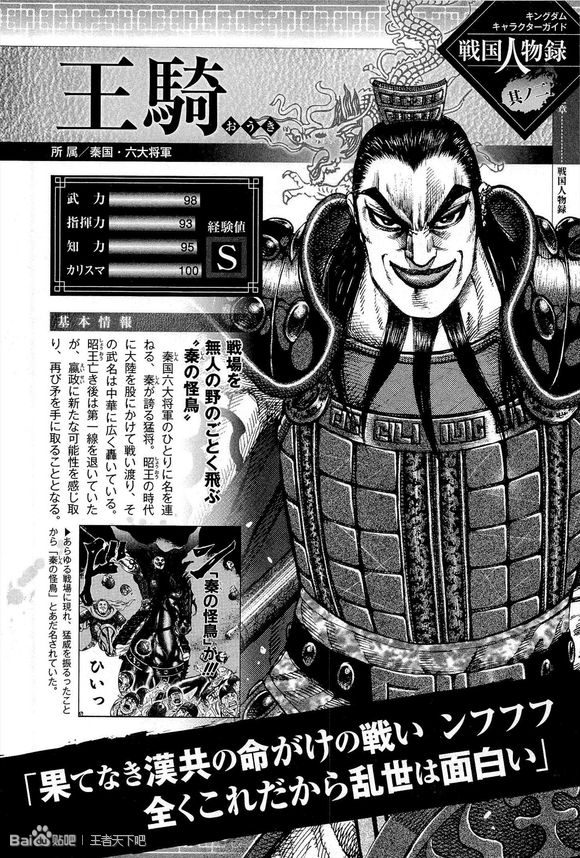
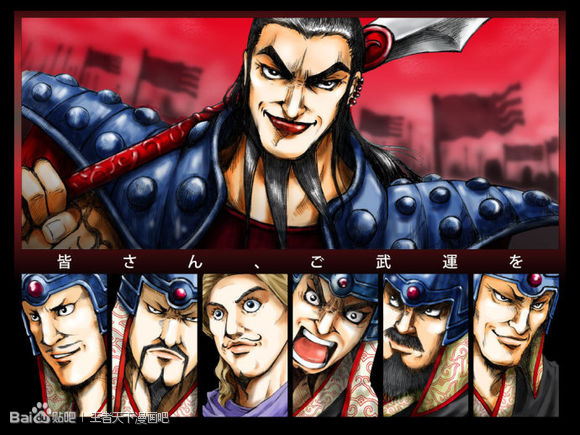
1. Name
In the manga:
Japanese/Chinese:王骑
Japanese pronunciation: Ou Ki
Chinese pronunciation:Wang Qi
In history:
Chinese: 王齮
Chinese pronunciation: Wang Yi
As you can see, the second characters of Ouki’s name in the manga and his original name in history are different and pronounced differently. The author changed his name slightly as this manga original language is Japanese. Japanese Kanji characters were borrowed from Chinese characters and thus most of them look exactly like Chinese characters. However, not all Chinese characters were included in Kanji. “齮” is one of the words that exist in Chinese but do not exist in Kanji. In fact, “齮” is a rarely used word in Chinese that even most ethnic Chinese do not know of the existence of this word. Since “齮” do not exist in Japanese language, the author have to replace it with another character in Japanese Kanji that looks similar to “齮” and so “骑” was used. This is the same for Huan Qi(桓骑)whose actual name Huan Yi(桓齮) and will appear later in the story.
2. Activities recorded in history
Wang Yi is in fact not a very well known general in history, despite his epicness in the manga. There are hardly any entries recorded in history about him.
From Wikipedia:
1)公元前247年(秦莊襄王三年),王齮担任将军,攻韩上党,秦庄襄王去世,秦王政即位. Translation: 247BC (third year of King ZhuangXiang’s reign), General Wang Yi attacked ShangDang of Han. King ZhuangXiang passed away, and King Zheng ascended the throne.
2)公元前244年(秦王政三年),王齮去世
Translation: 244BC(third year of King Zheng’s reign), Wang Yi passed away.
Source: http://zh.wikipedia.org/wiki/%E7%8E%8B%E9%BD%AE
There are other pieces of information i found on the net about Wang Yi but i will not post it here because of the following reason coming up in part 3…
3. Controversy of Wang Yi’s identity in history
As a Qin general, why can’t we find more information on him? Even Li Xin, our main character of Kingdom, has got more information than our favorite general. The reason is because Wang Yi might be Wang He(王齕, ‘He’ has the same pronunciation as ‘her’ without the ‘r’). Their names look very similar and Wang He has got loads of information recorded in Shi Ji, including the siege of Han Dan after the Battle of Chang Ping. Sima Zhen, a historian in the Tang dynasty who annotates Shi Ji annotated that Wang Yi IS Wang He. Well im not a history professor here so i have no idea if that is true. Anyway, Wang He is also in the manga, as another member of the 6 Great Generals. This is Wang He (this is from volume 29 so dont click around if you do not want to spoil yourself)
4.Myths+FAQ
1)“Ouki/Wang Qi is Wang Jian!!!The author killed him and the story is not going according to history!!”
Once again, Ouki/Wang Qi is NOT Wang Jian. Wang Jian will appear in the 5th arc. If you are dying to see how he looks like, here you go(again, dont click around if you do not want to be spoiled). Ouki/Wang Qi was too epic in the manga and many people who went to read up some stuff on history thought he was Wang Jian and this is the main reason why i started this thread. I have no idea whether Wang Jian will be as epic as Ouki/Wang Qi in the future of the manga as he is still a supporting character as of now but his achievements in the future are definitely epic.
2)“Ouki/Wang Qi is the most powerful general in the manga!!!”
No, he is one of the strongest but not the strongest. In the official guidebook written by the author, he is ranked S and have a 98/93/95(strength/command/intellect) stats, a total of 286(link). Ranking wise, the “military god” Yue Yi, is ranked SS, higher than any other character in the story. Stats wise, Yang DuanHe has got 95/99/95, a total stat of 289(link) and Lian Po has got 97/98/96, a total of 291(link). There are probably other characters with higher total stats or ranking but you get my point. Even within the 6 Great Generals, Ouki/Wang Yi is not the strongest. Refer to this pyramid and you can see him slightly below or equal to Bai Qi, the leader of the 6 Great General and below the SS rank Yue Yi. Then again, the stats, the pyramid and the guidebook are meant for reference only and may or may not reflect outcomes of battles in the manga.
3)“Why can’t i find any information about the 6 Great Generals system in history books/online etc.?”
That is because the system itself is fictional though the members are actual people in history. Same goes for the 3 Great Heavens, the 10 Archers of the Central Plains, the 4 Pillars of Lu’s faction and stuff like that…well except the 4 Great Lords of the Warring states(战国四君子) which is a real group with real people who existed in history but that was only mentioned 2 times in the manga so far.
4)“Are you a history major or something?Where did you get or these information?”
No…Since I can read Chinese, most of my information came from the Chinese Kingdom tieba forums (link) which contains plenty of information about Kingdom and the era of the Warring States contributed by people from China who have a better knowledge about their country’s 5000 years of history than most of us here. The rest came from google, wikipedia and from the basic Chinese history lessons i took in the past. Trust me, it is much easier to find large amount of information on Chinese history when you can read Chinese.
Do feel free to correct or add on to the information i have here. Would be more than happy to learn more about history since im really a fan of both the manga and Chinese history.
2. Hakuki/Bai Qi
Picture:
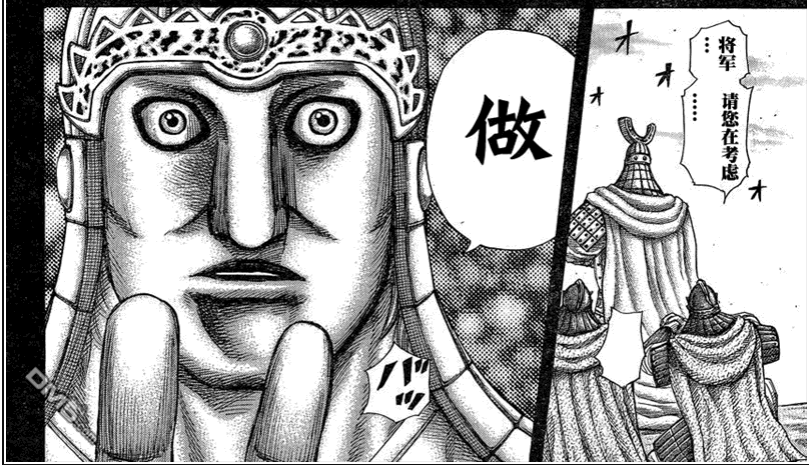
Wikipedia article
Leader of the 6 Great Generals in the manga and also the most well-known of the 6 in actual history.
Name
Japanese/Chinese: 白起
Japanese Pronunciation: Hakuki
Chinese Pronunciation: Bai Qi
He was also given the title of Lord Wu An. Nickname: The Butcher
Activities in History:
Bai Qi has racked up plenty of achievements in his lifetime for King ZhaoXiang of Qin. He was one of the most fearsome generals in China then and most generals do not dare to challenge him in a direct confrontation. He has participated in more than 70 campaigns, killed nearly 1 million enemies and capturing 86 castles while remaining undefeated. His most famous battles in history include the Battle of Chang Ping, Battle of Yi Que and the Battles of Yan and Ying, which severely weakened the different enemy states and made unification possible in the future.
Battle of Chang Ping(262-260BC):
Upon reaching a stalemate in the battle between the state of Qin and Zhao, Qin spies sowed discord between the Zhao king and the Zhao commanding general, Lian Po, resulting in the king replacing Lian Po with a weaker general, Zhao Kuo. Upon receiving the information that Lian Po was replaced, Qin promptly replaced their commanding general, Wang He with their best general, Bai Qi. The battle was quickly decided and Zhao suffered heavy losses as Bai Qi buried 400,000 surrendered Zhao soldiers and peasants alive. After this battle, the state of Zhao was severly weakened and do not pose much of a threat to Qin for the next few decades.
Battle of Yi Que(293BC):
As the neighbouring states of Wei and Han saw the powers of Qin rising, they formed an alliance and invaded Qin. The Qin armies led by Bai Qi were outnumbered at first but Bai Qi manage to turn the armies of Wei and Han against each other, resulting in an broken alliance and a win for Qin. 240,000 soldiers were killed in this battle and the states of Wei and Han were no match for Qin ever since.
Battles of Yan and Ying(279-278BC):
Prior to the battle, a Qin-Zhao alliance was formed and both states agreed to not attack each other. With that, King Zhao Xiang of Qin ordered the invasion of Chu and named Bai Qi the commanding general. As the Qin army invaded Chu, the morale of the Chu soldiers decreased and were retreating instead of fighting the Qin soldiers. Soon, the Qin army reached the castle of Yan(鄢), the final castle before the capital of Ying(郢). Plenty of soldiers were sent to Yan to prevent the Qin soldiers from moving further south into the capital. The Qin army then layed siege on Yan but failed to capture the castle. As the Qin army was has invaded too far into the vast lands of Chu, the battle must end as soon as possible in fear of reinforcements from other parts of the state. Bai Qi then instructed the soldiers to build a dam on the Yi river nearby and directed the stored water into Yan, flooding the castle and drowning the inhabitants. With Yan captured, the Qin army continued south towards Ying, the capital of Chu and destroying the Tombs of the Chu Kings along the way. King QingXiang of Chu fled Ying towards the east. After that, the conquered land became a permanent territory of Qin and Chu was severly weakened.
However, Bai Qi did not die a hero. After the Battle of Chang Ping, the Qin army, led by Wang He, continued east and layed siege on Han Dan, the capital of Zhao. Unable to conquer Han Dan, King ZhaoXiang ordered Bai Qi to lead the Qin army again, hoping to destroy Zhao once and for all. Bai Qi knew that it was impossible to win the battle and refused to lead the army by using the excuse that he was ill and unable to go to the battlefield. By disobeying the orders of the king, he was demoted to a mere soldier and was exiled from the capital of Xian Yang. As he was leaving the capital, the king’s messenger delivered a sword to him, hinting that the king wanted him to commit suicide which he promptly did.
Interesting Stuff
Bai Qi’s tactics can be concluded into 4 points below:
1) Unlike most generals who see capturing castles as their primary goal in wars, Bai Qi’s goal in wars is to annihilate the enemies, killing as many as he can.
2) In order to achieve the first point above, he likes to pursue his enemies as much as he thinks is safe.
3) Luring enemies out of their own fortresses or castle into forts he constructed in the middle of the battlefield which usually spell doom for his enemies. This was also mentioned by Renpa/Lian Po in the manga.
4) Accurately predicts the outcome of the battle even before the battle starts. This was also his main reason for winning every single battle in his life and refusing to answer to King ZhaoXiang’s summon to aid Wang He in the Siege of Han Dan.
Source: http://baike.baidu.com/view/2769.htm
3. Ou Kotsu/Wang He
Picture:
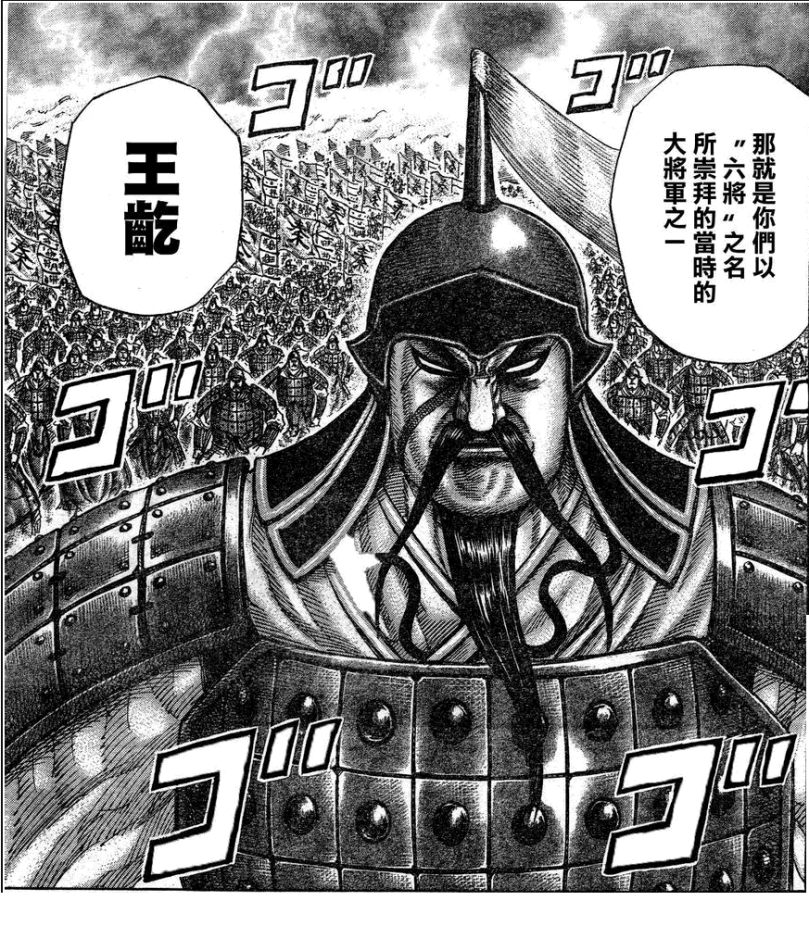
Name
Japanese/Chinese: 王齕
Japanese Pronunciation: Ou Kotsu
Chinese Pronunciation: Wang He
“He” is pronounced similar to “Her” and not “Hee” in Chinese.
Activities in History:
Due to the controversy that Wang Yi and Wang He might be the same person, I will list out all of Wang He’s achievements and activities in history below, including those that were already listed out in Wang Yi’s thread.
前260年(昭襄王47年),讨赵国、取上党。赵国反击,秦国秘密派遣白起为上将军增援,王龁为副将。长平 之战,大破赵国。
Translation: 260BC(47th year of King ZhaoXiang’s reign), attacked the state of Zhao and took the castle of ShangDang. Zhao retaliated. Qin secretly sent reinforcements led by Great General Bai Qi and Wang He was made the vice commander. The state of Zhao was severely weakened in the Battle of Chang Ping.
前259年(昭襄王48年),代武安君白起,将兵讨赵国,取皮牢。
Translation: 259BC(48th year of King ZhaoXiang’s reign), replaced Bai Qi, Lord of Wu An in the Zhao invasion and captured the castle of Pi Lao.
前258年(昭襄王49年),为王陵攻打赵国邯郸增军,以王龁替代王陵为主将。
Translation: 258BC(49th year of King ZhaoXiang’s reign), sent reinforcements to Wang Ling who was attacking Han Dan in the state of Zhao and replaced him as the commanding general.
前257年(昭襄王50年),邯郸攻不下,王龁与汾城郊外的秦军合流。其后,攻魏,斩首6千级,魏军败走, 汾城攻克,和张唐攻克宁新中。
Translation: 257BC(50th year of King ZhaoXiang’s reign), after failing to capture Han Dan, Wang He met up with his troops at the castle of Fen Cheng. He then attacked the state of Wei and killed 6000 men before the Wei soldiers retreated. The castle of Fen Cheng was successfully captured and he then captured the castle of NingXinZhong with General Zhang Tang.
前247年(庄襄王3年),攻韩上党,为太原郡。魏国信陵君率领五国军攻秦,蒙骜迎击,失败。秦军退却河内 之南的河外,联军解散。
Translation: 247BC(3rd year of King ZhuangXiang’s reign), attacked ShangDang of Han and renamed it TaiYuan county. Lord XinLin of Wei(1 of the 4 Great Lords of the Warring States) led the alliance army of 5 states and attacked Qin. General Meng Ao failed to stop the alliance army. Qin was forced to retreat to the southern bank of HeNei. The alliance army then dispersed.
始皇帝三年,王龁战死
Translation: 3rd year of Ying Zheng’s rule, Wang He died in battle.
Quite a nice resume there though his achievements were pretty much overshadowed by Bai Qi from the same generation.
Source: http://baike.baidu.com/view/1305783.htm
Interesting stuff:
The most interesting stuff about him is probably the controversy that he is actually Wang Yi. In Index of Shiji, written by Sima Zhen in the Tang dynasty, he stated that “王齮即王龁”, which literally translates to “Wang Yi is Wang He”. This explains both the lack of information about Wang Yi in most historical records and the many overlapping records about Wang Yi and Wang He. Perhaps Wang Yi and Wang He are indeed the same person in history but in Kingdom, they are 2 completely different characters with different traits. Wang Yi is an all rounded talented general in both offense and defense, second to only Bai Qi in the manga but Wang He is similar to Meng Wu in the manga, a man who is considered a “monster” in the strength department. The reason why the author decided to make Wang Yi and Wang He 2 different characters in the manga is currently unknown.
4. Kyou/Liao
Picture:
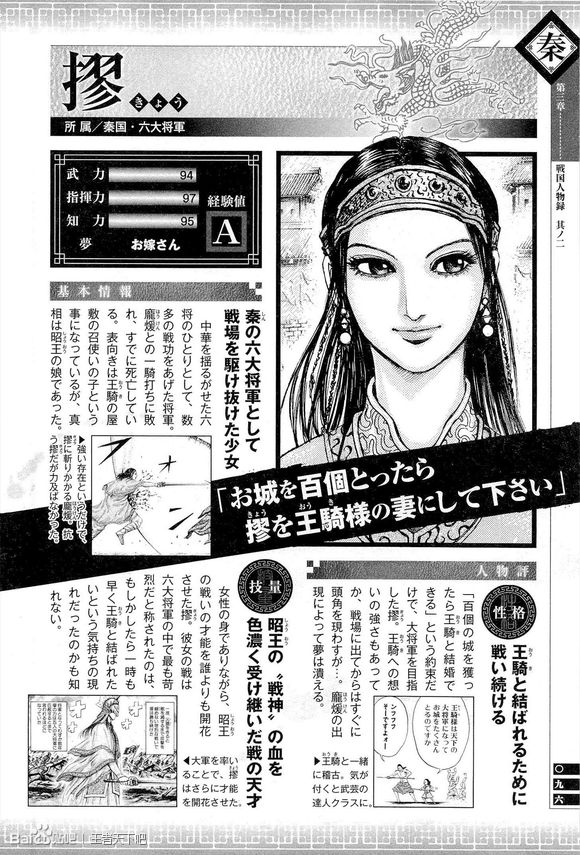
Name
Japanese/Chinese: 摎
Japanese Pronunciation: Kyou
Chinese Pronunciation: Liao
There are multiple pronunciations to this rare/ancient Chinese word(including “jiu”, “liu”, “jiao”, “nao”) and I have no idea which pronunciation to use for her name so I will go with the one that the anime subbers used.
Activities in history:
From ShiJi: Annals of Qin
昭王五十一年,摎为将军,攻韩,取阳城、负黍,斩首四万。攻赵,取二十余县,首虏九万。西周君背秦,与诸侯 约从,将天下锐兵出伊阙攻秦,令秦毋得通阳城。于是秦使摎攻西周。西周君走来自归,顿首受罪,尽献其邑三十 六城,口三万。秦王受献,归其君于周。
Translation: 51st year of King ZhaoXiang’s rule, General Liao attacked the castle of Yang Cheng and Fu Li in the state of Han, killing 40,000. Same year, killed 90,000 and captured 20+ districts from the state of Zhao. The state of Western Zhou formed an alliance with the other states and attacked Qin from Yi Que to stop Qin from advancing past Yang Cheng. The Qin army led by Liao attacked Western Zhou. Soon after, the ruler of Western Zhou came to Qin to apologize and gave up all of his 36 castles and 30,000 peasants to Qin, marking the end of Western Zhou state in history.
昭王五十三年,天下来宾。魏后,秦使摎伐魏,取吴城。
53rd year of King ZhaoXiang, all the states in China sent emissaries to pay respect to the king of Qin, with the exception of Wei. Qin sent Liao on a campaign against Wei and captured the castle of Wu Cheng.
Just like the other generals of that time, there wasn’t much recorded about Liao in history, which gave the author plenty of freedom to cook up a story about Liao.
Source: http://baike.baidu.com/view/132516.htm
Interesting Stuff
Like other females in this manga, Liao is probably a guy in history and not a girl, and definitely not Wang Yi’s wife. The author probably made Liao a girl in the manga for the romance element which the manga severely lacked otherwise. Whether he/she is a son/daughter of King ZhaoXiang is also something we do not know as his/her surname cannot be found in any historical records we have today.
5. ShiBa Saku/Sima Cuo
Picture:
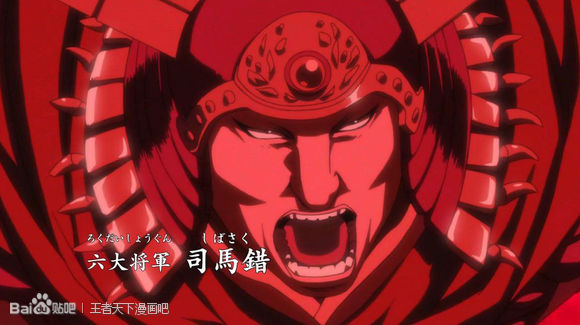
Name
Japanese/Chinese: 司马错
Japanese Pronunciation: ShiBa Saku
Chinese Pronunciation: Sima Cuo
Activities in history:
He is probably most well known for his debate with Zhang Yi during King HuiWen of Qin’s reign, on whether to attack the weaker states of Ba and Shu, south of Qin, or to invade Han to the east of Qin. There was an entire chapter on this in Intrigues of the Warring States(战国策) on this.
The story:
During the 9th year of King HuiWen’s reign(316BC), the states of Ba and Shu were in war while the Qin planned to invade the state of Han during the same year. King HuiWen summoned his advisors, Sima Cuo and Zhang Yi and asked them which state should Qin attack. Zhang Yi suggested that Qin should attack the state of Han while Sima Cuo suggested that Qin should attack Ba and Shu. The king then asked them to persuade him with the details and reasons of their suggestions.
Zhang Yi spoke first, suggesting that Qin should form an alliance with Chu and Wei and attack Han with a three-pronged attack. With Wei attacking from the north and Chu attacking from the south, Qin will push from the west and close in on the 2 states of Zhou(located near Han and Qin borders), which houses the now king of the now non-existent Zhou empire. Qin should then threaten the Zhou king(who was once in control of the entire China) to hand over the 9 cauldrons, a symbol of kingship, over to Qin. With the 9 cauldrons and the Zhou king, Qin will have control of the entire China. On the other hand, invading Ba and Shu, lands ruled by the Rongs of the West, is a waste of manpower and money as they will not bring any benefit to Qin.
Sima Cuo then rebutted, saying that in order for a country to prosper, there are 3 factors. First, the country needs to expand its territory. Second, the country need a strong army, which can only be achieved if its people are strong and rich. Thirdly, the ruler needs to build up his reputation. As of now, Qin’s territory is small(as compared to the other states) and the people in Qin are poor. Sima Cuo adviced the king that he should start with a simpler campaign by invading the Ba and Shu region, which was in chaos. By doing so, Qin will acquire a huge piece of land and the vast amount of resources within it(achieving factors 1+2). By invading Ba and Shu, Qin will build up its reputation by bringing peace to the region and not harming its inhabitants(achieving factor 3). On the other hand, by invading Han and threatening the king of Zhou, Han and Zhou will definitely seek help from their neighbouring states of Qi, Zhao, Chu and Wei, forming a strong alliance against Qin. Qin will then be defeated and lose a significant amount of land together with the 9 cauldrons.
After listening to their debate, King HuiWen decided to go with Sima Cuo’s safer option and sent both Sima Cuo and Zhang Yi on a campaign to invade Ba and Shu which was very successful and completed within 10 months. This doubled Qin’s territory and securing the fertile lands of the Ba and Shu region, providing the Qin army with resources for unification in the future.
Other achievements:
秦武王元年(前310年),因蜀相陈庄叛秦,司马错受命协助平定蜀乱,甘茂诛陈庄。
First year of King Wu of Qin(310BC), Chen Zhuang, Prime minister of Shu rebelled against Qin. Sima Cuo was tasked to suppress the rebellion.
秦昭王六年(前301年),蜀侯辉反,司马错平叛,并诛郎中令等27人,平定蜀中。
6th year of King ZhaoXiang(301BC), Count of Shu rebelled against Qin, Sima Cuo was tasked to suppress the rebellion(again), killing 27 high ranking officials, bringing peace to Shu.
昭王十六年,司马错担任客卿,受命攻魏,取轵(今河南济原南),攻韩,取邓(今孟县西)。
16th year of King ZhaoXiang(291BC), Sima Cuo as a mercenary general, was tasked to attack the state of Wei, capturing the castle/region of Zhi. He then attacked the state of Han and captured the castle/region of Deng.
十八年,司马错与白起等又攻取魏国六十一座城邑。
18th year(of King ZhaoXiang’s reign), Sima Cuo and Bai Qi captured 61 castles from Wei.
秦昭王二十七年(前280年),率陇西兵及巴蜀兵十万人,从蜀地沿江而下,攻楚黔中(今湖南西部及贵州东北 部)(参见>黔中之战),迫楚献出汉北及上庸地(今湖北西北部)于秦,实践了他得蜀即得楚的部 分预言。
27th year of King ZhaoXiang’s reign(280BC), (Sima Cuo) led soldiers from LongXi and the region of Ba and Shu, travelled along the Yangtze river downstream from the lands of Shu to attack the QianZhong region of Chu, forcing Chu to offer Qin the lands of HanBei and ShangYong in exchange for a truce.
Source: http://baike.baidu.com/view/48418.htm
Interesting Stuff
Sima Cuo is actually the ancestor of Sima Qian, the author of Shi Ji, 8 generations apart from each other. As of now(chapter 356), we do not have much information about Sima Cuo in the manga except that he was part of the 6 Great Generals.
6. Ko Shou/Hu Shang
Picture:
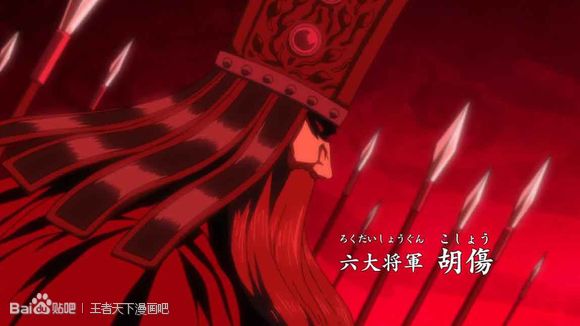
Name
Japanese/Chinese: 胡伤
Japanese Pronunciation: Ko Shou
Chinese Pronunciation: Hu Shang
He has an alternate name of Hu Yang(胡阳) in actual history.
Activities in history:
He was a pretty unknown general much like the many characters of Kingdom.
周赧王四十二年(公元前273年),秦将白起和胡阳联合指挥在华阳(今河南新郑北)各个击破赵、魏联军的一 次长途奔袭作战。同年,也是在华阳之战前,胡阳自己统率军队攻占了魏国的卷、蔡阳、长灶三城。
42nd year of King Nan of Zhou(273BC), Bai Qi and Hu Yang of Qin commanded armies at HuaYang(modern Henan province, north of XinZheng) and defeated the alliance army of Zhao and Wei in a long distance pursuit. For more information, refer to Battle of Hua Yang below.
Same year, before the Battle of Hua Yang, Hu Yang led the Qin army and invaded Wei, capturing the castles of Juan, Cai Yang and Chang Zao.
The last known record of Hu Yang was his participation in the Battle of E Yu, which he was defeated by Zhao She.
Battle of Hua Yang
40th year of King Nan of Zhou(271BC), the states of Zhao and Wei formed an alliance to invade Han. Han seek help from Qin. King ZhaoXiang of Qin agreed and sent Bai Qi and Hu Yang to assist Han in repelling the invaders. The alliance army of Zhao and Wei was laying siege on the Han castle of Hua Yang, which was pretty far from the Qin-Han borders. The alliance strategists predicted that the Qin army would not arrive at Hua Yang within a short period of time and thus did not prepare their defenses. Knowing this, Bai Qi(presumably with Hu Yang) led a large army from Qin capital, Xian Yang, and rushed towards the Hua Yang battlefield at the speed of 100 Li per day(~50km per day). The Qin army reach Hua Yang within 8 days and launched a surprise attack on the Wei camp, killing 130,000 Wei soldiers and capturing 3 Wei generals. The army of Qin then proceed to attack the Zhao camp, drowning 20,000 Zhao soldiers and went on to chase the retreating alliance army all the way back to Wei and closing in to the Wei capital of Da Liang. Wei offered the land of NanYang in exchange for a truce. Knowing that Zhao has allied with Yan to save Wei from this crisis, Qin accepted the offer and retreated.
Battle of E Yu(partly from wikipedia, http://en.wikipedia.org/wiki/Zhao_She)
King ZhaoXiang of Qin, using the excuse of Zhao not handing over the castles as promised in an earlier deal, sent Hu Yang to attack E Yu, a castle of Zhao.
Zhao He, the ruler of Zhao, then appointed Zhao She to lead a reinforcing army to rescue E Yu. Zhao He equipped his troops with light armor for mobility and reached Qin forces’ rear. Qin forces, in fear of being trapped, lifted the siege and turn its full strength against the approaching Zhao forces. Zhao He hid most of his troops on a mountain, which he estimated the Qin troops would approach by dusk. Sure enough, the Qin forces approached, and Zhao He ambushed them in the dark. With determination and bravery Zhao She defeated the Qin forces. The ruler of Zhao rewarded Zhao She by making him the administrator of a district called Ma Fu (馬服 in present day north of Handan city in Hebei province).
Interesting Stuff
Battle of E Yu was the last time Hu Yang’s name was recorded in the history books, in which he suffered a defeat under the hands of Zhao She and his punishement(if any) for this defeat was not recorded. His disappearance after the defeat could be because he was executed, removed from his duties as a general, or exiled from Qin as a punishment for his defeat.

Tbanks a lot.
I eead a lot about the history.but
I cant undesrta d it rightaway on the mobie manga -Kingdom
This lkng wide article enlight me
Thanks,
Luki
LikeLike
More Bonuses https://mercenaries.pw
LikeLike
Source https://hydra2020gate.com
LikeLike
Update?
LikeLike
Okay, nice info to share bro
Hope soon i can learn it for further
LikeLike
Wow, this is quite mind blowing. Thanks a lot for sharing this information
LikeLike
Thanks! this is helpful! gonna read you other posts!
LikeLike